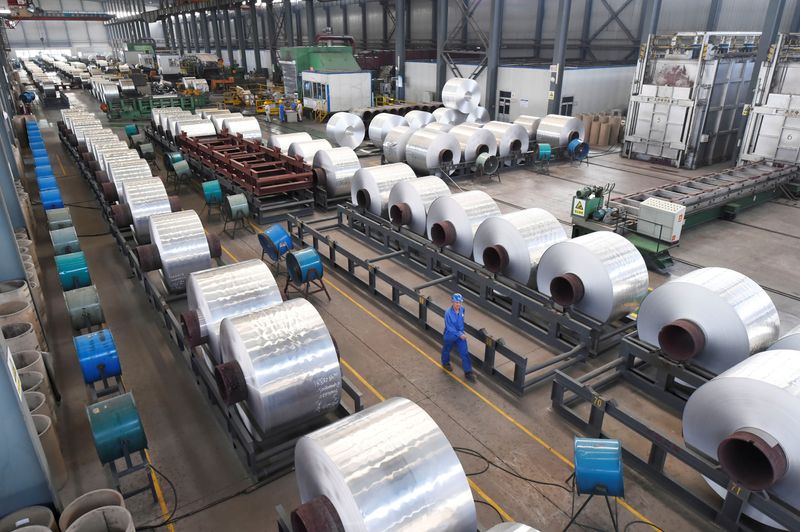BEIJING/LONDON (Reuters) – New capacity for converting bauxite into alumina due online next year is set to ease tight supplies and potentially halt a record-breaking price rally of the material used to make aluminium.
Higher alumina prices outside China have turned the top producer and consumer into a net exporter this year from a net importer and boosted prices of aluminium, which is used in the transportation, construction and packaging industries.
Disruptions in supplies of bauxite from Guinea and Brazil and output suspensions in Australia contributed to a 70% surge in alumina prices this year to a record 5,645 yuan ($779.77) per metric ton on the Shanghai Futures Exchange. Aluminium prices are up around 7% this year.
“There doesn’t seem to be an end to this tightness of alumina, not immediately,” said Eivind Kallevik, CEO at Norwegian aluminium producer Hydro.
“New alumina refineries expected to start up in Indonesia and India will add more tons to the market.”
Global alumina supplies last year totalled 140 million metric tons, according to the U.S. Geological Survey, unchanged from the previous year.
More supply is in the pipeline.
In China, more than 13 million tons of new capacity is due to come online next year, according to information provider Shanghai Metals Market (SMM).
In India, Vedanta (NYSE:VEDL) plans to invest in a plant with annual capacity for 6 million tons of alumina by 2026. In Guinea, an arm of Emirates Global Aluminium plans to build a 2 million tons-a-year alumina refinery, slated to open in September 2026.
And in Indonesia, two state companies plan to double capacity at their refinery in West Kalimantan province to 2 million tons but have not specified a timeline.
Meanwhile, elevated alumina prices and higher profit margins are expected to further incentivise use of China’s capacity, adding to supply. China’s alumina capacity of 102.7 million tons is being utilised at a rate of 83.6%, SMM said.
“Alumina (OTC:AWCMY) producers have shown strong willingness to maintain a high operating rate this year spurred by handsome profit margins,” analysts at China’s state-backed research house Antaike said.
“But production might be affected if heavy pollution this winter lasts a long time, exacerbating tight supply.”
LOOMING SURPLUS
China’s January-September alumina exports rose 33% from the same period last year to 123.57 million tons, fetching an average price of $541 a ton, about 10% more than the price on the Shanghai exchange over the same period.
Some analysts, seeing a looming oversupply, forecast lower alumina prices for 2025. UBS predicts an average price of 3,600 yuan a ton in 2025, while Antaike pegs it at 4,000 yuan a ton.
“We expect China’s alumina market to step into a supply glut from February and the price will slide as a result,” said Sharon Ding, head of China basic materials at UBS.
In China, SMM expects the market to swing to a surplus of 960,000 tons in 2025 from a deficit of 235,000 tons this year, while globally UBS expects a surplus of 890,000 tons in 2025 following a shortage of 920,000 tons in 2024.
Surpluses in 2025 are likely to be higher if demand growth slows because of a government-mandated cap of 45.5 million tons of aluminium production.
SPOOKED BY DISRUPTIONS
This year’s alumina deficits are due to multiple factors.
U.S. aluminium producer Alcoa (NYSE:AA) closed its Australian Kwinana refinery, with annual capacity of 2.19 million tons, in the second quarter.
In May, Rio Tinto (NYSE:RIO) declared force majeure on alumina from its refineries in Queensland, Australia. Its Yarwun refinery can produce 3 million tons of alumina annually. It did not respond to a Reuters request for an update.
“Some big sources of alumina have been lost this year including from Rio Tinto, which isn’t expected to be back at normal production until sometime early next year,” said Liberum analyst Tom Price.
Last week, Alcoa halted bauxite shipments from Juruti Port in Brazil due to a stranded vessel, adding to nervousness in a market already spooked by export disruptions from Guinea.
Flooding in Guinea earlier this year limited bauxite shipments, which again were disrupted by customs suspending exports by Guinea Alumina Corporation (GAC), a subsidiary of Emirates Global Aluminium (EGA).
($1 = 7.2393 Chinese yuan renminbi)




